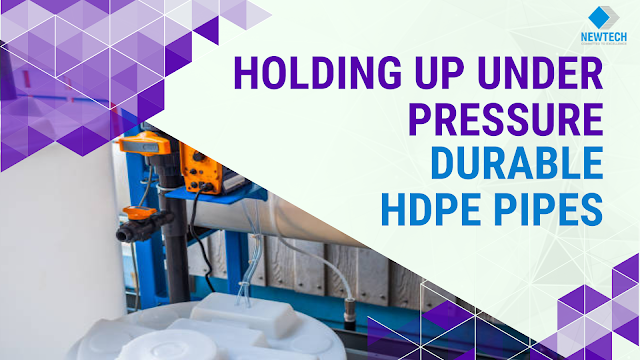Holding Up Under Pressure: The Science Behind Durable HDPE Pipes
Introduction
In the world of pipelines, durability is a paramount concern. High-Density Polyethylene (HDPE) pipes have gained immense popularity for their ability to withstand extreme conditions and pressure. In this article, we will delve into the science behind the durability of HDPE pipes, understanding why they are the preferred choice for a wide range of applications.
If you want to more detail. Get Acces Now
What is HDPE?
High-Density Polyethylene (HDPE) is a versatile thermoplastic polymer renowned for its exceptional strength and durability. It's used in a variety of industries due to its unique combination of properties.
The Science of HDPE Pipe Durability
1. Molecular Structure
HDPE pipes owe their remarkable durability to their molecular structure. The long, tightly packed chains of polymer molecules create a robust and flexible material that can withstand pressure without deforming.
2. Impact Resistance
HDPE pipes are engineered to absorb impacts without shattering. This makes them perfect for environments where unexpected external forces may come into play.
3. Corrosion Resistance
Unlike metal pipes, HDPE pipes are impervious to corrosion. They won't rust or corrode, ensuring a long service life.
4. Flexibility
The flexibility of HDPE pipes allows them to adapt to changing conditions. They can bend without breaking, making them suitable for areas prone to ground movements.
Applications of HDPE Pipes
1. Water Distribution
HDPE pipes are widely used in water distribution systems. Their resistance to corrosion and leaks ensures clean and safe water delivery.
2. Sewer and Drainage Systems
In wastewater management, HDPE pipes are a top choice due to their resistance to chemical and biological agents, minimizing the risk of leaks or contamination.
3. Gas Transport
For natural gas distribution, HDPE pipes offer a safe and reliable solution. Their flexibility and durability prevent gas leaks and ruptures.
4. Agricultural Irrigation
Farmers rely on HDPE pipes for irrigation. Their resistance to UV exposure and chemicals makes them ideal for agricultural applications.
Environmental Advantages
1. Recyclability
HDPE pipes are environmentally friendly, as they are fully recyclable. This reduces the carbon footprint associated with their production and disposal.
2. Energy Efficiency
The low friction coefficient of HDPE pipes reduces the energy required to pump water or gas through the system, making them energy-efficient.
Conclusion
When it comes to pipelines, HDPE pipes stand strong against the pressures of time and harsh environments. Their molecular structure, impact resistance, and corrosion resistance make them a durable choice. They find applications in water distribution, sewage systems, gas transport, and agricultural irrigation. Not only are they tough, but they are also environmentally friendly, contributing to a sustainable future.
Get Access Now: https://newtech-pipes.com/hdpe-pipes/
FAQs
1. Can HDPE pipes handle extreme pressure?
Yes, HDPE pipes are engineered to withstand high pressure, making them suitable for various applications.
2. Do HDPE pipes require special maintenance?
HDPE pipes are low maintenance as they are resistant to corrosion and require minimal upkeep.
3. Are HDPE pipes environmentally friendly?
Absolutely, HDPE pipes are recyclable and energy-efficient, reducing their environmental impact.
4. Can HDPE pipes be used in areas with shifting ground?
Yes, the flexibility of HDPE pipes makes them ideal for areas prone to ground movements.
5. Are HDPE pipes suitable for transporting chemicals?
Yes, HDPE pipes are resistant to a wide range of chemicals, making them suitable for chemical transport.








No comments:
Post a Comment